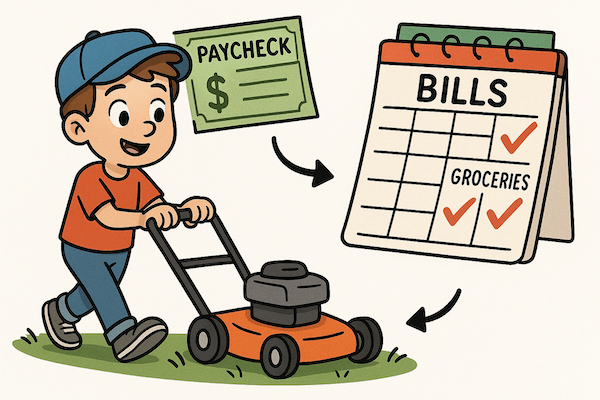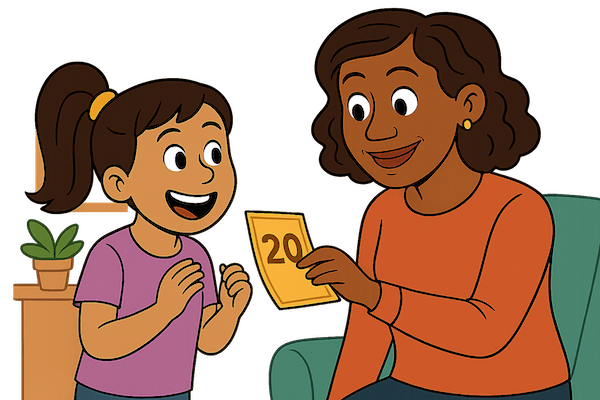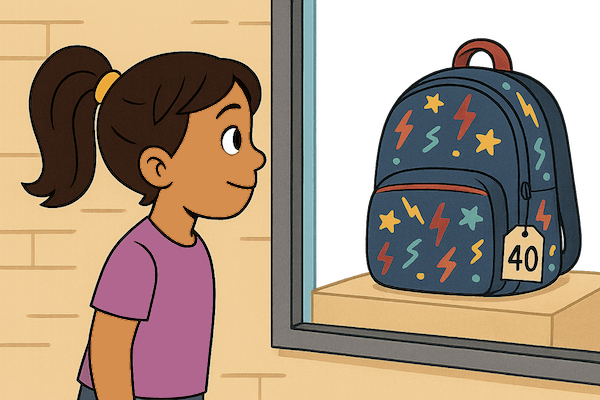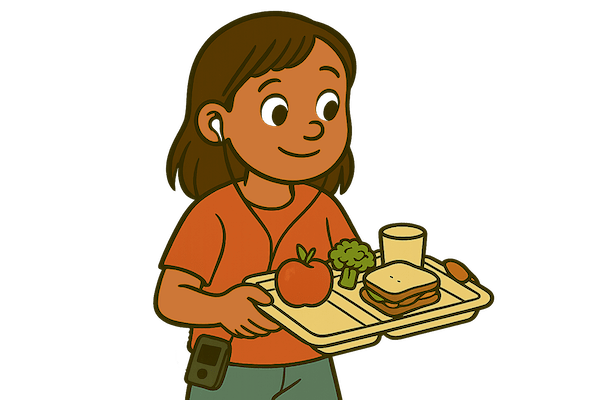Sign In
Savings and Spending JHS







| | 12 Theory slides |
| | 15 Exercises - Grade E - A |
| | Each lesson is meant to take 1-2 classroom sessions |
Catch-Up and Review
Here are a few recommended readings before getting started with this lesson.
Basic Money Concepts:
- What is money?
- How do people earn, receive, and use it?
Needs vs Wants
Simple Arithmetic with Money:
- Adding, subtracting, and comparing dollar amounts
Decision-Making Basics:
- Understanding trade-offs (
If I buy X, I might not afford Y
)
Maya's Budget Challenge
Maya has a part-time babysitting job that pays $100 per week.
She has some regularly occurring expenses:
- School lunch
- Fun activities (like going to the movies or playing video games)
- Miscellaneous things (like downloading songs or buying snacks)
Maya also has savings goals:
- Buy a new laptop within the next year
- Start growing her college fund
Understanding Wants and Needs
When it comes to money and making choices about how to spend it, it is helpful to understand the difference between wants and needs.
Needs are essential things that we require to live and be healthy. They include:
- Food and water
- A place to live
- Clothing and shoes
- Basic school supplies
These are things that we cannot do without. We need them to survive and to participate in daily activities. Wants, on the other hand, are things that we would like to have, but we can live without them. They include:
- Toys and games
- Entertainment, such as movies or concerts
- Treats, such as candy or snacks
- Luxuries, such as a new phone or a vacation
Wants vs. Needs: What's What?
Sort the items into wants or needs. Remember: needs are essential, wants are nice to have!

Income vs. Expense
Income or Expense?
Understanding Savings and Spending
Savings is money that is put aside instead of being spent right away so that you can use it later for emergencies or big goals. On the other hand, spending refers to using your money to buy things you need or want. In particular, planned spending is when you decide to spend money on wants, like a new game or concert tickets, and make sure to include it in your budget.

What is a Budget?
A budget is a plan for how to use your money wisely. It shows how much money you will get, how much you expect to spend on things you need and want, and how much you plan to save over a set time.

Budgeting a Weekly Allowance
Emma gets $20 a week for her allowance. She needs to use $10 to pay for her school lunches. She also wants to spend $5 renting movies and $4 on snacks when she hangs out with her friends.
Hint
Solution
&School Lunches:&$10 &Movie Rentals:&$5 &Snacks:&$4 School lunches are necessary, but movie rentals and snacks are not. The expenses that are wants are movie rentals and snacks.
$20 - $10 = $10 Emma has $10 left after paying for her needs.
Total Cost of Wants $5 + $4 = $9 She can cut either snacks or movie rentals — or both — to free up at least $5 for savings.
Emma's New Backpack
Emma wants a new backpack that costs $40. She plans to save $5 each week.
Hint
Solution
40/5 = 8weeks It will take Emma 8 weeks to save enough money for the backpack.
$40 + $20 = $60 To find the total number of weeks Emma needs to save money to buy these things, we divide the total cost by her weekly savings. $60/5 = 12weeks Emma needs to save for 12 weeks to buy both the backpack and the shoes.
$60/4=$15 Emma needs to save $15 each week in order to buy the backpack and shoes before school starts.
Earning Extra to Save Faster
Emma wasn't going to be able to save enough money each week to buy all of the things she wanted for the new semester so she decided to help out her next door neighbor to earn the extra money. Now her weekly income includes:
- $5 savings from her allowance
- $5 for walking their dog
- $10 for mowing their lawn

Hint
Solution
$5 + $5 + $10 = $20 Emma can save $20 each week now.
Substitute values
Calculate quotient
Making Maya's Budget
Now that we've learned so much about what it means to make a budget, let's look back at Maya's situation. Remember that she has a part-time job that pays her $100 per week. She wants to make sure she uses her money wisely so that she can afford her regular expenses and meet her savings goals.
We need to know how much each of her expenses cost her on a weekly basis to help her make her budget. This is what she tells us.
| Expense | Weekly Cost |
|---|---|
| School lunch | $25 |
| Fun activities | $20 |
| Miscellaneous things | $10 |
Now let's remember her savings goals!
- Buy a new laptop within the next year
- Start growing her college fund
If we want to decide how much money can be set aside for each of her goals, we need some more information about each one. Her goals need to be more specific. Let's see what she says when we ask her for some more details.

Hint
Solution
$780 ÷ 52 = $15 She needs to save $15 each week to reach her goal of $780 in 52 weeks.
Noah wants a pair of headphones that cost $45. He saves $6 each week.
Noah wants headphones that cost $45 and he saves $6 each week. We can find out how many weeks it will take Noah to save enough money for the headphones by dividing the cost of the headphones by his weekly savings. $45/$6=7.5 Since Noah cannot save for half a week, we need to round up to the nearest whole number. It will take Noah 8 full weeks to save enough money.
Now, let's see what happens if Noah gets $3 more per week for doing his chores. His new weekly savings will be $6 + $3 = $9. Once again, let's divide the cost of the headphones by his weekly savings.
$45/$9=5
If Noah gets $3 more per week for chores, it will take him 5 weeks to save enough money for the headphones.
To sort the budget categories, let's identify which ones are needs and which ones are wants.
Needs are things we must have to live and be healthy. Wants are things we would like to have, but can live without.
School supplies are a need because we need them to learn and do our schoolwork. Rent is also a need because we need a place to live. Without a home, we wouldn't have a safe place to stay. Rent is more essential than school supplies because a home is a basic necessity.
- Rent
- School Supplies
Cell phone data and subscriptions are wants. Cell phone data is a more important want because it helps us communicate and access information. Subscriptions, on the other hand, are just for entertainment.
- Cell phone data
- Subscriptions
All together, the order from most essential to least essential is:
- Rent
- School supplies
- Cell phone data
- Subscriptions
Maya earns $30 per week. She spends:
- $10 on lunch
- $10 on games
- $5 on clothes
- $5 on savings
Maya earns $30 per week and sets $5 aside for savings. She wants to increase her weekly savings to $10 so she needs to save an additional $5. Let's consider each of the given plans for her to meet her savings goal.
Spending Less on Games
Maya currently spends $10 on games. If she reduces this to $5 or less, she could meet her goal. ccc Games budget & Added savings & Savings total 5 & 10 - 5 = 5 & 5 + 5 = $10 4 & 10 - 4 = 6 & 5 + 6 = $11 3 & 10 - 3 = 7 & 5 + 7 = $12 2 & 10 - 2 = 8 & 5 + 8 = $13 1 & 10 - 1 = 9 & 5 + 9 = $14 0 & 10 - 0 = 10 & 5 + 10 = $15
Cutting Lunch Spending to $8
Maya currently spends $10 on lunch. If she cuts her lunch spending to $8, she will save an additional $2 per week. $5 + $2 = $7 Her total weekly savings is only $7, which is less than her goal. This plan does not work.
Eliminating Clothing Purchases
Maya currently spends $5 on lunch. If she stops buying new clothes entirely, she will save an additional $5 per week. $5 + $5 = $10 This would bring her up exactly to her goal. This plan works great.
Asking for More Allowance
If Maya asks for $10 more allowance, her income would increase by $10. $30 + $10 = $40 Her savings would then be $5 + $10 = $15. This plan works too.
Conclusion
The plans that could work to help Maya meet her goal are spending less on games, eliminating clothing purchases, and asking for more allowance.
Logan needs $60 for a school trip in 3 weeks. He saves $10 per week from allowance and he starts babysitting for $15/week.
Logan needs to save money for a school trip. He saves $10 per week from his allowance and earns $15 per week from babysitting. Let's calculate how much he saves in 3 weeks.
Logan can save $75 in 3 weeks.
Logan needs $60 for the school trip. We know that he can save $75 in 3 weeks. Let's compare the two amounts.
75 > 60
Since $75 is more than $60, he will meet his goal.
If Logan only saves from his allowance, he saves $10 per week. He needs $60 for the school trip. Let's calculate how many weeks it will take him to save $60.
$60/$10= 6
Logan would need 6 weeks to save $60 if he only saved from his allowance.
Julian has $25. He wants to buy a new video game for $40. Let's see how much money he needs. $40 - $25 = $15 Now that we know how much more Julian needs, let's review each plan one at a time to see which one is the best.
| Option | Reasoning |
|---|---|
| A. Buy the game now using a credit card | This is not a very good idea because he will still owe the money and credit cards can have fees and interest. |
| B. Wait and save $5 per week for 3 more weeks | He needs $15 more to afford the game so, if he has the ability to save $5 each week, waiting for 3 more weeks is a wise decision. |
| C. Borrow $20 from a friend and pay them back slowly | This is not a good idea because he will owe money — and more money than he needs to buy the game! Also, borrowing money is a risky move that can ruin friendships. |
| D. Forget the game and spend the money on snacks | Julian really wants the game, so this might not be the best plan. He might regret it a lot in the future. |
Comparing all the plans, option B seems to be the best. Julian can save money and buy the game without owing anyone anything. A. & * B. & ✓ C. & * D. & *






